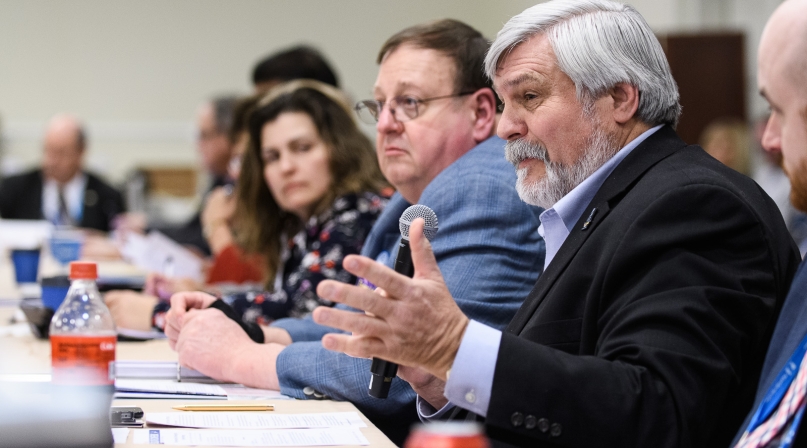NACo rolling out mobile app to test broadband speeds

Key Takeaways
At their meeting Saturday, members of NACo’s Telecommunications and Technology Policy Steering Committee expressed frustration over lack of internet and cellphone service in many parts of the country, but there was one bright spot: NACo plans to launch a mobile app, dubbed “TestIT,” geared toward getting accurate information when it comes to who has broadband — and more importantly who does not.
NACo partnered with the Local Initiatives Support Corporation and the Rural Community Assistance Partnership to develop the app to identify areas with low connectivity to help ensure adequate funding for broadband infrastructure. App users will be able to test their broadband speeds with the push of a button. NACo will roll out the app Monday at the conference.
Learn More
Download the TestIt for Apple iOS
Test your connection in as many places as you can
The TestIt app does not store personal data
Meanwhile, representatives from the offices of Sens. Amy Klobuchar (D-Minn.) and Shelley Moore Capito (R-W.Va.), took part in a discussion Saturday afternoon with frustrated members of NACo’s Telecommunications and Technology Policy Steering Committee who talked about poor internet and cell phone service. In Capito’s home state, 74 percent of rural residents do not have access to broadband.
Kent County, Del. Commissioner Allan Angel, vice chair of the committee, said he can’t talk to constituents in his own county in some areas due to poor cell phone service, but he can go all the way to Hawaii and talk to family members back home and service is just fine.
Another county official said she hears from constituents who write to the Federal Communications Commission, but never hear a word back. “Thousands have made complaints to the FCC, with no action — they blame me,” said Henrico County, Va. Commissioner Patricia O’Bannon.
Another member, Sherburne County, Minn. Commissioner Raeanne Danielowski said her county is stuck with a provider who receives federal funding for landline services, but won’t upgrade the service and won’t allow competitors to lay fiber.
“We are falling way behind,” she said. “It’s a conversation we’ve been having for a long time. Kids are sitting outside of restaurants at 10 o’clock at night looking to get broadband.”
Also read: Serious concerns raised about FCC Mobility Fund map.

Attachments
Related News

Congress considers moratorium on state and local AI lawmaking: What it means for counties
The U.S. Senate’s reconciliation bill text includes a 10-year moratorium on state and local AI policymaking.

NACo Legal Advocacy: Federal Communications Commission, et al v. Consumers' Research, et al
Federal Communications Commission, et al v. Consumers’ Research, et al. (FCC v. Consumers’ Research) could jeopardize what is known as the Universal Service Fund (USF). Through the USF, the FCC has provided billions of dollars to local governments and our residents, helping provide essential telecommunications and broadband services to unserved and underserved communities. FCC v. Consumers’ Research challenges the FCC’s legal authority behind the USF, putting multiple programs essential to equitable broadband deployment at risk.

NACo Legal Advocacy: McLaughlin Chiropractic Associates, Inc. V. McKesson Corporation
McLaughlin Chiropractic Associates, Inc. V. McKesson Corporation could make it more difficult for counties to challenge FCC orders, many of which have taken steps to preempt and curtail local authority by limiting counties’ abilities to manage their own right of way and assess fair market value permitting and impact fees on providers seeking to construct, modify or extend telecommunications infrastructure in their communities.
